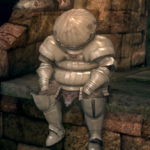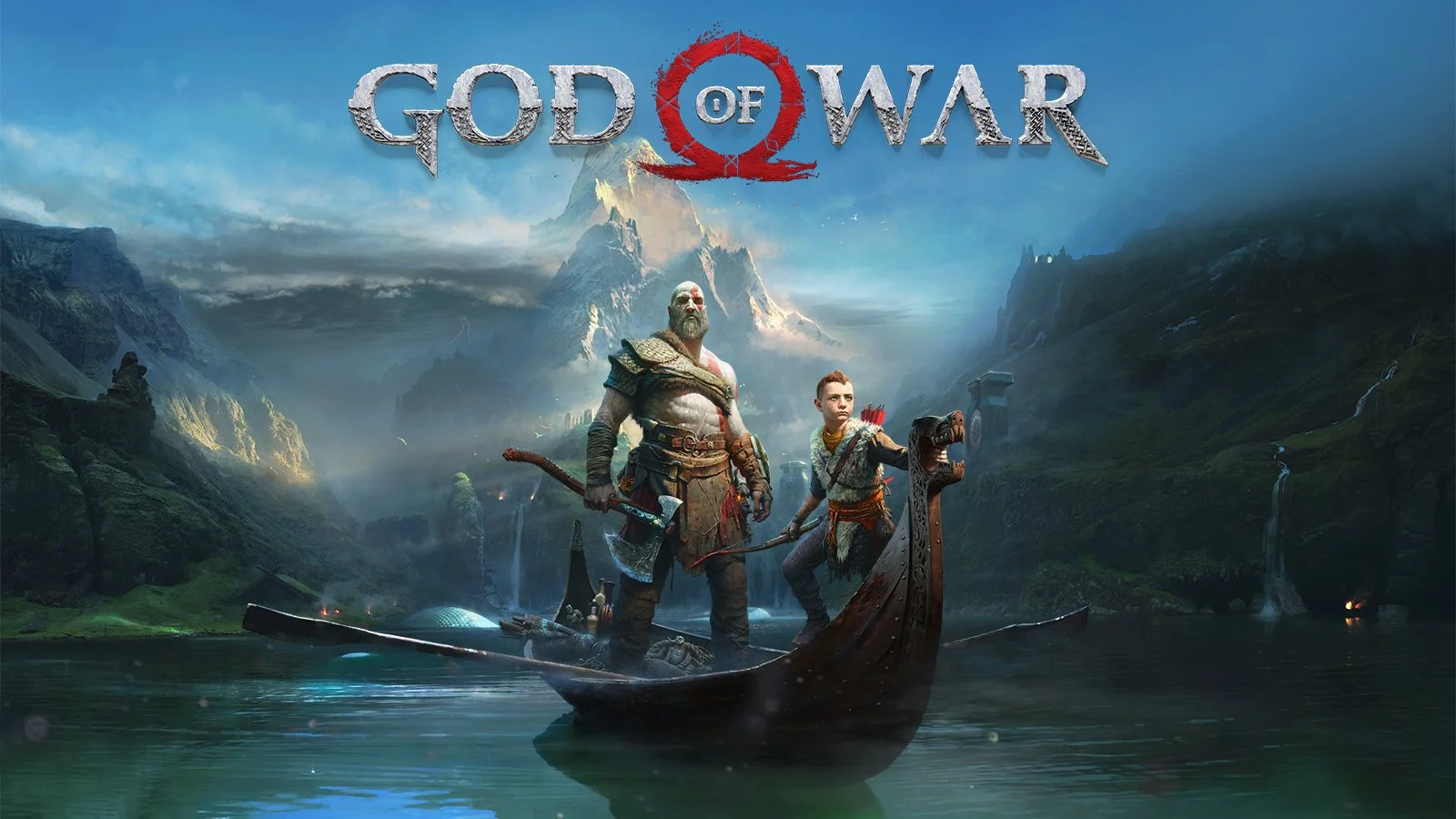
⭐️ Games that receive this star have a score of 95% or above. This is purely from a game design perspective and is not in any way related to our morality evaluation.
The original God of War series developed by Santa Monica Studio, following the Spartan god Kratos as he strives to kill the entire ancient Greek mythical pantheon, was a major success. Beginning in 2005 on the PS2, after 6 games the story was finished in 2013 with God of War: Ascension.
But after many years of anticipation, the God of War reboot (simply titled God of War) was released as a PS4 exclusive in 2018 and would go on to beat Red Dead Redemption 2 for Game of the Year at the Game Awards. After watching Jacksepticeye play it back in 2018, I decided to finally play it for myself ahead of God of War: Ragnarök’s release. What I can say is: wow, what a game.
Story
The story of God of War can be summed up in a few words: sad, heartfelt, and amazing. In a very interesting turn of events, the series has leaped from Greek mythology to Norse mythology (a choice I could gush about forever). After unintentionally destroying Greece by killing the gods, Kratos left and arrived in Midgard, the Earth realm in Norse mythology. Kratos wanted a fresh start as a normal man, marrying a woman named Fae and having a son named Atreus. The game starts at Fae’s funeral pyre, with Kratos and Atreus setting off to fulfill her dying wish that her ashes be spread at the highest mountain in the Realms. However, as they begin their quest, they find themselves being mysteriously hunted down by the gods of Asgard (where the Norse gods live), led by Odin the Allfather. As they journey through the Norse realms, they come across numerous characters, places, and artifacts from Norse mythology.
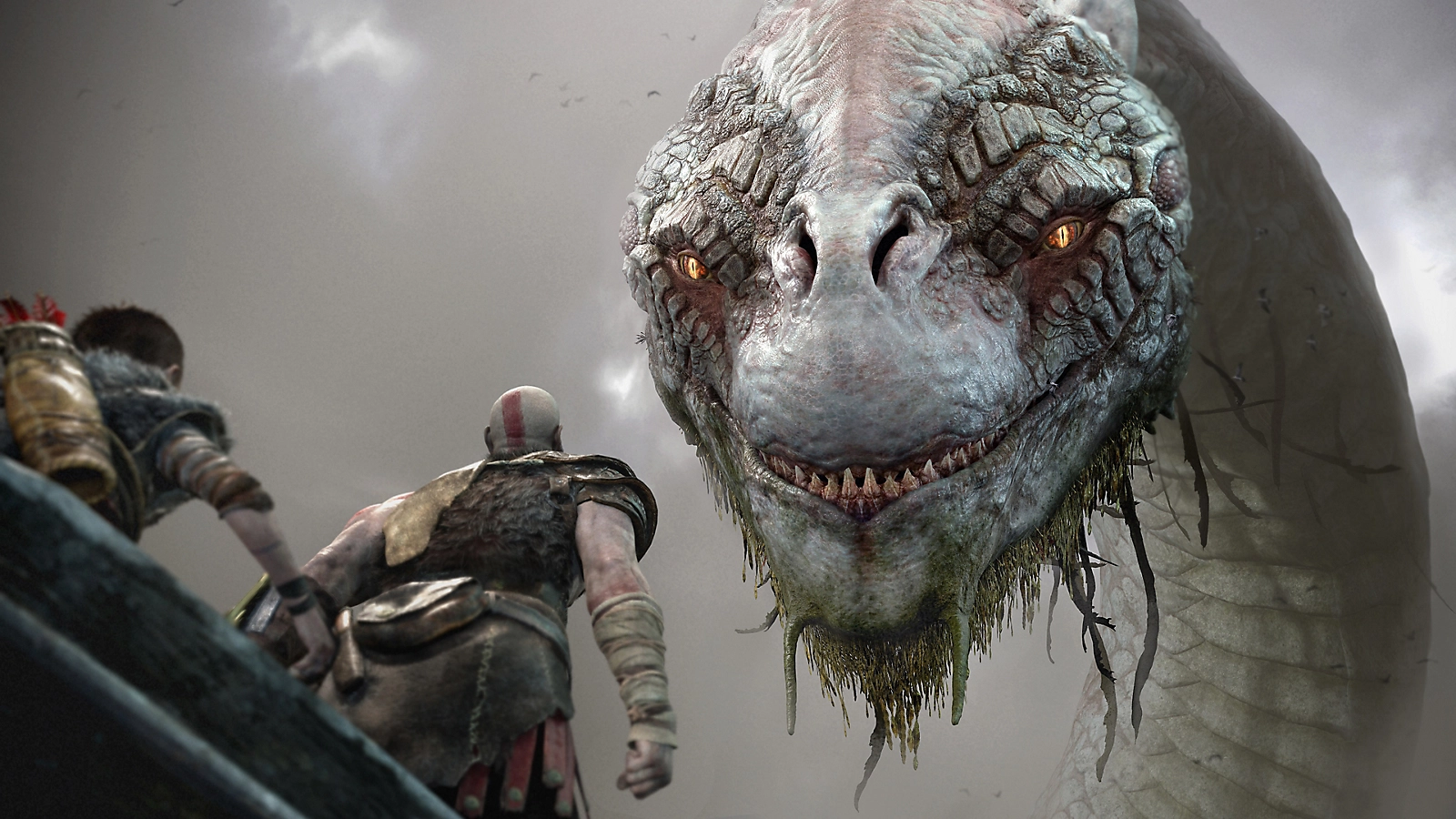
One of the many mythological Norse characters you’ll meet is Jormungandr the World Serpent, who’s actually a big softie.
The story is easily the best part of the game. At its heart the story of God of War centres around the troubled relationship between Kratos and Atreus, as Kratos struggles to be a loving father while both of them deal with their grief over Fae’s death. Also, Kratos lives in shame of his violent past and continues to be haunted by it, to the point of hiding his godhood from Atreus. Amongst all the action and spectacle, at its foundation this game is about these two characters and their individual struggles and growth, as well as their relationship with each other. The numerous cutscenes and enormous amounts of dialogue allow the player to learn about these characters and inevitably come to love them. As well, the fact that Kratos and Atreus’ goal during the entire 40 hour story is simply to spread the mother’s ashes as she asked gives the story a lot of heart as well.
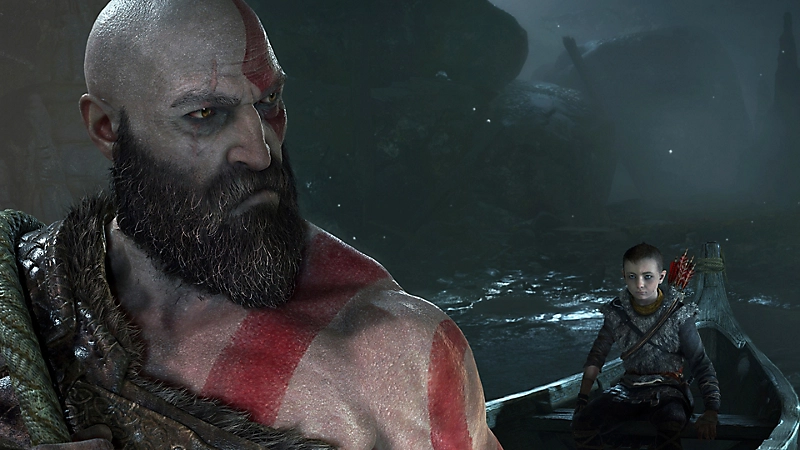
One of the tender moments between Kratos and Atreus that make you adore them.
Gameplay
The gameplay consists mostly of fighting enemies as you traverse the land, exploring the map, and solving puzzles.
There are four difficulty levels to choose from at the beginning of the game (which can also be changed at any time): Give me a Story (easier gameplay so you can enjoy the story), Give me a Balanced Experience (both story and moderately challenging gameplay), Give me a Challenge (more difficult gameplay), and Give me God of War (very hard gameplay – this difficulty level, unlike the others, cannot be changed at any time). I myself went with Balanced Experience.
The combat is the biggest part of the gameplay, which I must say is very fun. You can ‘stun’ enemies by filling up a red ‘stun’ bar beneath the enemy’s main health bar, which allows you to either deliver a one-shot death blow or use them to damage other enemies (while still damaging the enemy you’re using in the process). Kratos has a “Spartan Rage” bar below his health bar that when full enough, can allow Kratos to go into a short burst of rage where he does extra damage. Even though you play as Kratos, you can also control Atreus to shoot arrows or perform special abilities to help you. There is also an extensive skill tree with lots of sweet combos to learn. As well, you can customize the special moves your weapons have and add special enchantments to your armour (which provide perks).
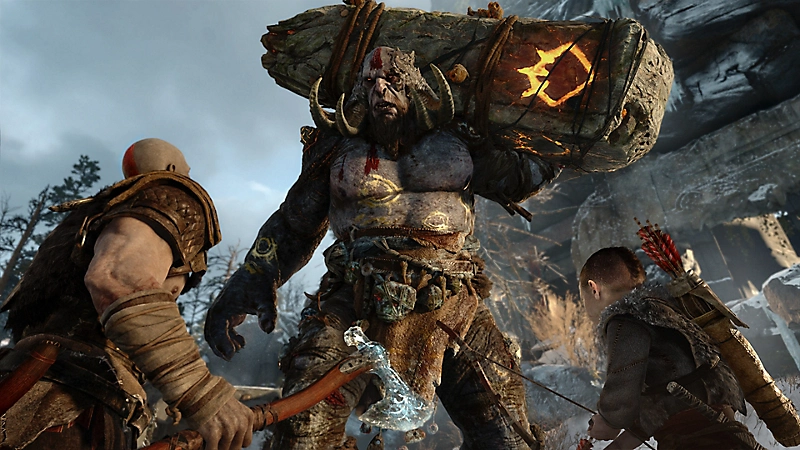
Trolls are one of the many enemies you will face on your journey.
On your journey you meet the dwarven blacksmiths Brok and Sindri (who are also from Norse mythology) who have shops set up all over the various maps. There you can craft armour, upgrade your gear, buy enchantments, and sell items. However, the best perk of these dwarves is that they are hilarious and heartwarming characters.
There are also lots of areas and activities around the maps of the different Norse realms. Some entire realms are optional, such as the fiery world of Muspelheim. While not required to progress the story, completing non-required content provides a lot of good gear and upgrades (even items that will permanently increase your health and Spartan rage bars). There are loads of hidden chests to find throughout the game, and big hidden chambers scattered throughout the map that provide the optional endgame content: fighting the fearsome Valkyries to free them from Odin’s control.
In both the story and optional content, there are many cleverly-designed puzzles to solve. They could be to open a door to the next part of the journey or just to unlock a special chest. As you pick up more and more abilities throughout the game, you will be able to solve more and more of the optional puzzles scattered around the maps. These puzzles can be a doozy sometimes, especially the optional ones, but are always so satisfying to solve.
To top it all off, after completing the story the “new game +” option is unlocked (which means you can play the game again with all the gear and materials you already have except it is much more difficult). Certain players may also choose to replay the game on harder difficulty modes to test themselves.
Environment, Graphics, and Music
All of the environments in this game are breathtaking, and are all very high fantasy. They range from underground dwarven mines to endless plains of ice watched over by an enormous raven. Most of the areas make smart and heavy use of Norse knots, dragons, and other designs from Viking art in the structures within the environments. As you travel, the player gets to round out their knowledge of Norse mythology by listening to characters tell tales as you boat from place to place and by finding murals that tell you bits of lore. Basically everything I know about Norse mythology comes from what I learned from this game.
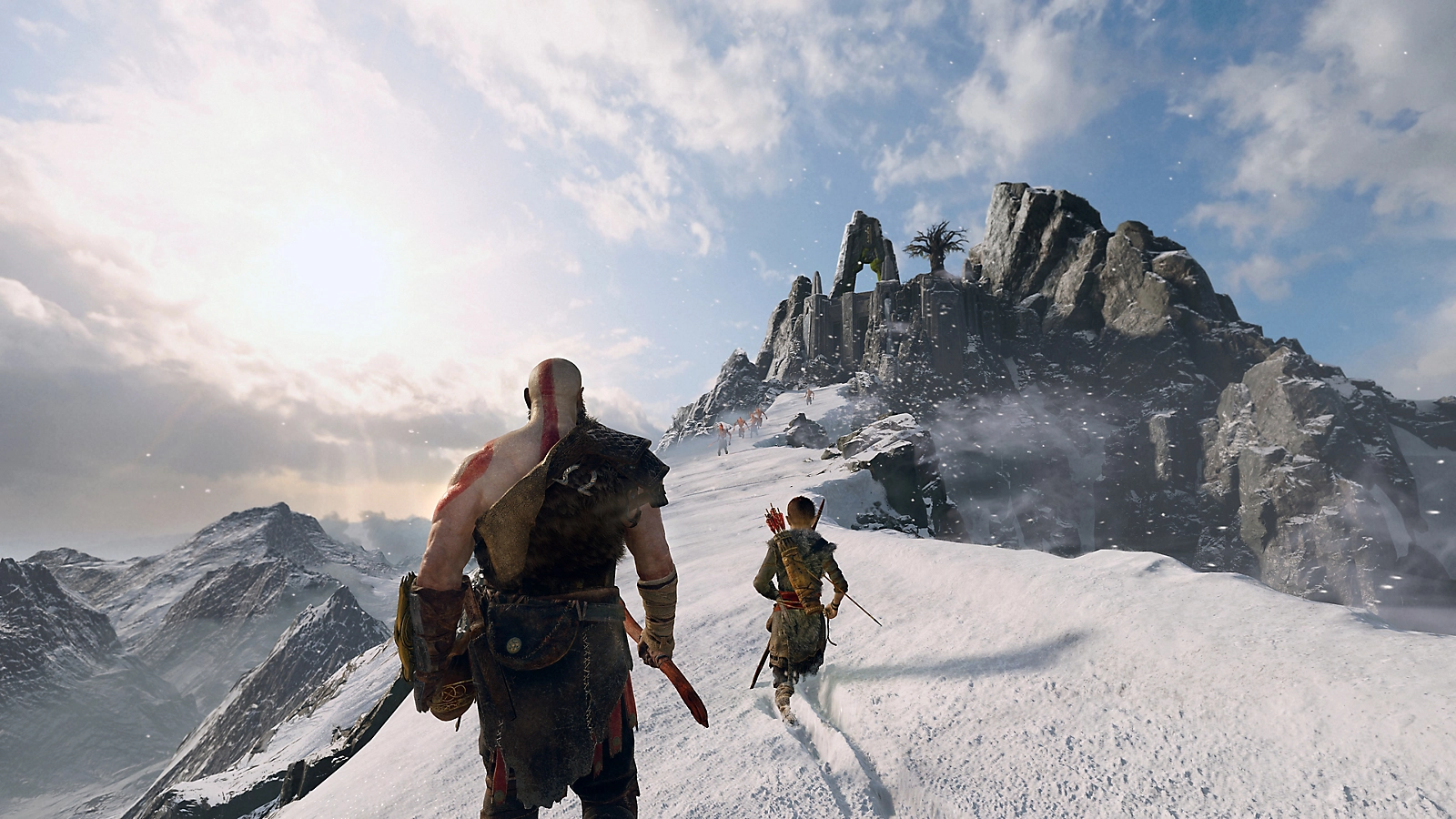
Just another gorgeous view, no biggie (you’ll be seeing lots of these).
The graphics are phenomenal and some of the best I’ve ever seen, and all the characters look just like the actors who play them (except Christopher Judge, who plays Kratos, since in the game his face needs to be moulded to match that of the original Kratos).
The musical score, done by Bear McCreary, is amazing. It is filled with uplifting gravatas, tension, or sorrow depending on the scene, and overall feels very Norse (thanks to the inclusion of old Norse lyrics and traditional Scandinavian singers).
Criticisms:
The only real shade I can throw at this game is the fact that after the story is over, there is really no point to exploring the maps and doing the endgame content unless you are one of those people who love 100%ing things. Yes, you would get lots of good gear and items from doing all these activities, but when the story (the driving force of the game) was over, I didn’t see the point in it because there is really no reason to get this gear anymore. As well, I didn’t do a massive amount of exploring and side-questing and still got through the game just fine.
However, if you were on a harder difficulty I can see why you would probably need that gear more than me. As well, I also think it’s possible that some people could be so in love with the game’s fighting mechanics that they gladly would do more content even after the story was over.
Our Faith
Oddly enough, for a game set in a pagan world filled with swearing and intense violence, the ways in which it can connect to our faith as Roman Catholics is countless. It touches on so many valuable take-aways, so I will mention the most important ones.
First off, fathers must be disciplining but also be loving to their children (as the Old Testament states). This is something Kratos struggles to do with Atreus: Kratos orders him around, calls him “boy” instead of by his name, and is constantly being a harsh critic. Because of this, their relationship is struggling, even though Kratos shows (when prompted by circumstance or when no one is around) that he loves Atreus very deeply and will protect him at all costs (Atreus, however, cannot see Kratos’ love for him since he hides it, so he thinks Kratos is disappointed in him). Fathers, or anyone with any kind of relationship with someone else, must be hard when necessary but otherwise gentle and loving (and be willing to visibly show others that you love them), just like Christ did during His ministry.
Another great theme in God of War is the evils of pride and wrath (two of the seven deadly sins, I might add). In the game, the gods of Asgard are infamous for their haughtiness and cruelty, to the point where godhood alone almost always corrupts someone in such ways. Kratos himself, while hiding his godhood and violent past from Atreus (partly because in this world being a god means to become an arrogant monster), desperately wants Atreus to be a better man than he was and to forsake all revenge and bloodlust (which Atreus can have trouble doing at times). There are some other great things I could discuss concerning this topic but unfortunately those are spoilers. We too must forsake pride and wrath, two of the very things that corrupted Lucifer. And just as Kratos does with Atreus, we must help guide others to forsake that path as well, lest they become as bad as an Asgardian.
Conclusion
To wrap all this up, God of War is an overall fantastic game deserving of all the praise it has received. Behind the Soulsbourne games, God of War is now one of my favourite games of all time. From the fun combat mechanics to the heartfelt story, I would highly recommend it (if you’re old enough of course). I can’t wait until God of War: Ragnarok releases simply because I desperately want to return to these characters I’ve grown to love so much and see their stories progress forward.
Scoring – 96%
Story: 5/5
Graphics: 5/5
Controls: 5/5
Gameplay: 5/5
Replayability: 4/5
Parental/Morality Issues
Violence: The game can get quite violent at times. When you hit enemies (or enemies hit you), some blood quickly splatters out. However, when stun-killing an enemy the animations can get very graphic, like ripping an enemy in half or slicing their jaw off (but these animations are usually done to monsters, if that is of any consolation). Around the maps, pale corpses of soldiers or thieves can be found often, some of which can be in graphic condition. Some cutscenes can also get violent, like punching someone to the point where they are covered in blood or carving the heart out of a dead troll.
Occult: The game takes place within the pagan religion of the medieval Scandinavians. As much of a sucker as I am for Norse mythology, it is still full of ideas concerning the divine, creation, and the structure of the universe that are contrary to Christianity (which many people actually believed at one point).
As well, many pagan practices are seen in the game. First off, the game revolves around the spreading of the mother’s ashes, an act prohibited by the Church. Many characters have numerous tattoos of Norse symbols and designs. Also, certain characters and enemies use primitive magic, including outlined conjuring-circles on the ground and the use of animal and human remains to aid their magic.
Language: Most characters don’t use harsh language but a select few (especially Brok the dwarf) use very strong language.
Sexual Content: There are several jokes said by Brok throughout the game that are on the crude side. Other than that, the game is free of sexual scenes and scaldalous clothing.
